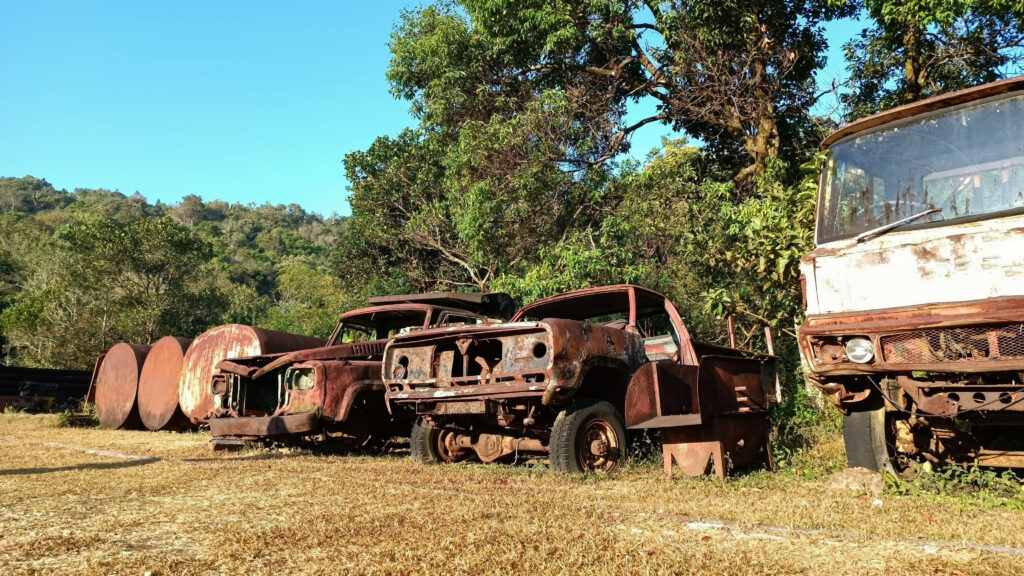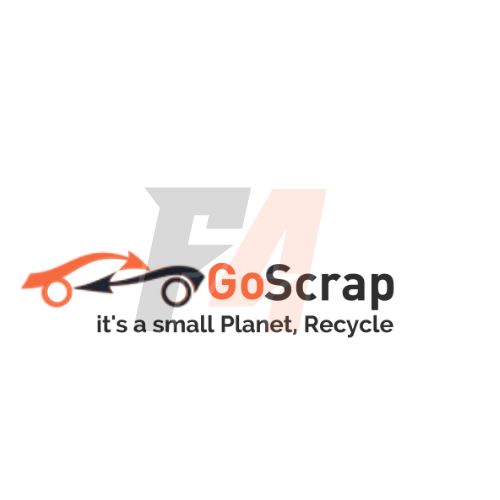What is a Vehicles scrap yard and How Does It Operate?
A vehicles scrap yard, also known as an automotive salvage yard or junkyard, is a facility where old, damaged, or end-of-life vehicles are collected, dismantled, and either recycled or disposed of responsibly.
These yards play a crucial role in the automotive lifecycle, offering a sustainable way to manage vehicles that are no longer roadworthy.

Purpose of a Vehicles Scrap Yard
The primary purpose of a vehicles scrap yard is to recycle and including repurpose automotive materials, reducing environmental waste.
When a vehicle reaches the end of its life, it contains various reusable components and recyclable materials such as metal, glass, and rubber.
Scrap yards extract these resources and process them for reuse, minimizing landfill waste and conserving natural resources.
How Does a vehicles scrap yard near me Operate?
The operation of a vehicles scrap yard involves several steps:
1. Vehicle Acquisition
Vehicles arrive at a scrap yard through multiple channels, such as:
- Individuals or businesses selling old or damaged vehicles.
- Insurance companies scrapping totaled cars.
- Abandoned or seized vehicles collected by local authorities.
Scrap yards often buy vehicles based on their weight, condition, and the value of their recyclable materials.
2. Initial Inspection and Documentation
Upon arrival, the vehicle is inspected and its details are documented. Legal requirements, such as proof of ownership, are verified to prevent handling stolen vehicles.
3. Draining Fluids and Removing Hazardous Materials
Before dismantling, the vehicle undergoes a depollution process. This involves safely draining all fluids, such as:
- Engine oil
- Transmission fluid
- Brake fluid
- Coolant
- Gasoline or diesel
4. Dismantling and Salvaging Parts
After de-pollution, the vehicle is dismantled. Including Usable parts like engines, transmissions, alternators, and tyres are removed, tested, and cleaned.
Moreover These parts are sold as used auto parts to consumers or repair shops, offering a cost-effective alternative to buying new components.
5. Vehicles Scrap Yard Near Me– Recycling Materials
Once reusable parts are removed, the process crushes or shreds the remaining vehicle body.
Advanced sorting technologies separate metals like steel, aluminium, and copper and send them to recycling facilities.
Including this recycled materials then become components for manufacturing new vehicles, construction materials, or other products.
6. Disposal of Non-Recyclable Materials
Materials that cannot be recycled, such as certain plastics or upholstery, are disposed of in compliance with waste management regulations.
Modern scrap yards strive to minimize this portion to reduce environmental impact.
Benefits of Vehicle Scrap Yards
- Cost Savings: Affordable used parts benefit consumers and repair industries.
- Economic Contribution: Scrap yards generate employment and contribute to the circular economy.

The Environmental Advantages of Using a Local Scrap Yard
Using a local scrap yard for disposing of old, damaged, or end-of-life vehicles offers numerous environmental benefits.
These facilities play a vital role in reducing waste and conserving natural resources, including promoting sustainable practices in the automotive industry.
Here’s a detailed look at the environmental advantages of utilizing a local scrap yard.
1. Effective Recycling of Vehicle Materials
One of the most significant environmental benefits of scrap yards is their ability to recycle a large portion of a vehicle.
Cars contain various materials such as steel, aluminium, copper, rubber, and glass, all of which can be recycled.
By processing these materials, local scrap yards help reduce the demand for mining and manufacturing new resources, which are energy-intensive and environmentally damaging.
For example, recycling steel from vehicles saves up to 74% of the energy required to produce new steel. This reduces carbon emissions and helps conserve finite natural resources like iron ore.
2. Reduction in Landfill Waste
If vehicles are not disposed of through proper channels, they may end up in landfills, where they occupy valuable space and release harmful substances into the soil and water.
Scrap yards prevent this by responsibly dismantling and recycling vehicle components. Hazardous materials, such as engine oil, transmission fluid, and brake fluid, are safely removed and disposed of in compliance with environmental regulations.
By diverting vehicles from landfills, local scrap yards significantly reduce environmental contamination and promote cleaner communities.
3. Lower Carbon Footprint Through Local Operations
Moreover choosing a local scrap yard minimizes the need for long-distance transportation of vehicles, thereby reducing carbon emissions associated with fuel consumption.
Supporting a nearby facility also contributes to a more localized recycling process, which often has a smaller environmental impact compared to centralized or distant operations.
Additionally, the availability of recycled auto parts from local scrap yards reduces the need to manufacture new parts, further decreasing emissions from production and transportation.
4. Responsible Disposal of Hazardous Materials
Vehicles contain several hazardous components that can pose significant environmental risks if not handled correctly. These include:
- Batteries containing lead or lithium.
- Airbags with explosive chemicals.
- Mercury switches.
- Coolants and refrigerants.
Local scrap yards are equipped to safely remove and dispose of these materials, including preventing them from leaching into the environment. This ensures compliance with environmental regulations and protects ecosystems from contamination.
5. Encouragement of a Circular Economy
Scrap yards are a critical component of the circular economy, where materials are reused and recycled instead of being discarded.
Local scrap yards reduce waste and create value from discarded vehicles by extracting usable parts and recycling raw materials.
Moreover this approach not only benefits the environment but also contributes to the economy by providing affordable used parts and materials for various industries.
6. Community Impact and Awareness
Using a local scrap yard promotes environmental awareness within the community.
When individuals see the tangible benefits of recycling and proper waste management, they are more likely to adopt sustainable practices in other areas of their lives.
Local scrap yards often engage with their communities, encouraging responsible disposal and reducing the environmental footprint of vehicle ownership.
How to Find the Best Vehicles scrap yard near me: Tips and Resources
Finding the best vehicles scrap yard near you ensures a smooth, hassle-free process for disposing of your old or damaged vehicle while maximizing its value.
A reliable scrap yard offers fair pricing, proper documentation, and environmentally responsible recycling. Here are some tips and resources to help you locate the best scrap yard in your area.
1. Research Local Options
Start by compiling a list of scrap yards in your vicinity. Use online resources such as Google Maps, Yelp, or business directories to find nearby facilities.
Searching for keywords like “vehicles scrap yard near me” will provide a list of options along with reviews, ratings, and contact information.
Community forums, local social media groups, and word-of-mouth recommendations from friends or family can also be excellent sources of information about trustworthy scrap yards.
2. Check Licensing and Certifications
Ensure the scrap yard operates legally and complies with local regulations. Including reputable scrap yards should hold the necessary licenses and certifications to handle vehicle disposal and recycling.
Certification from recognized organizations, such as the Automotive Recyclers Association (ARA) or local environmental agencies, indicates adherence to industry standards.
3. Evaluate Customer Reviews and Reputation
Online reviews and testimonials are valuable for assessing a scrap yard’s reliability and customer service. Look for feedback about:
- Pricing transparency.
- Professionalism in handling transactions.
- Responsiveness and ease of communication.
- Adherence to environmental practices.
Avoid facilities with frequent complaints about unfair pricing, poor customer service, or illegal activities.
4. Compare Pricing and Services
Different scrap yards offer varying rates for vehicles based on factors such as weight, make, model, and condition.
Contact multiple facilities to request quotes and compare their offers. While price is important, also consider additional services such as:
- Free vehicle pickup or towing.
- Assistance with paperwork, such as deregistration.
- Immediate payment, preferably in cash.
Choosing a scrap yard that balances fair pricing with convenience ensures a better overall experience.
5. Prioritize Environmental Responsibility
Environmental sustainability is a key aspect of choosing a scrap yard. Reputable facilities follow eco-friendly practices, such as:
- Safe disposal of hazardous materials (e.g., oil, batteries, refrigerants).
- Recycling and repurposing vehicle parts and materials.
- Minimizing waste sent to landfills.
Some facilities may provide certifications or reports confirming their compliance with environmental standards, which can give you added confidence in their operations.
6. Confirm Documentation and Legal Processes
A professional scrap yard ensures all transactions are properly documented. This includes:
- Issuing a Certificate of Destruction or similar proof of vehicle disposal.
- Verifying ownership documents to prevent the handling of stolen vehicles.
- Providing clear terms and conditions for the sale or scrapping process.
These measures protect you from future liabilities related to your scrapped vehicle.
7. Utilize Online Resources and Apps
Several online platforms and mobile apps can help you find and compare scrap yards.
Including websites like CarTakeBack, Scrap Car f4goscrap, Comparison, and local recycling directories provide tools for locating nearby facilities, estimating vehicle scrap value, and booking services.
The Process of Selling Your Vehicle to a Scrap Yard: What to Expect

Selling your vehicle to a scrap yard can be a straightforward and rewarding process if you understand what to expect.
Whether your car is damaged, old, or no longer roadworthy, scrap yards provide an efficient way to dispose of it responsibly while earning some cash.
1. Assess the Value of Your Vehicle
Before approaching a scrap yard, assess your vehicle’s condition and potential value.
Factors influencing its value include its weight, make, model, age, and the condition of its parts. Vehicles with reusable components, such as engines or transmissions, typically fetch higher prices.
Use online tools or platforms like scrap car comparison websites to get an estimated value.
This information can help you negotiate effectively with the scrap yard.
2. Vehicles scrap yard near me– Gather Necessary Documents
Most reputable scrap yards require proof of ownership to ensure the vehicle isn’t stolen.
The key documents you’ll need include:
- Vehicle Title: Proves you’re the legal owner.
- Identification: A government-issued ID is often required.
- Deregistration or Insurance Documents: In some regions, you may need to deregister the vehicle or cancel insurance before scrapping.
Check local regulations to confirm the specific requirements.
3. Find a Reputable Vehicles scrap yard near me
Research scrap yards in your area by reading reviews and comparing quotes.
Look for licensed and certified facilities to ensure compliance with legal and environmental standards. Contact multiple yards to get the best offer for your vehicle.
Some scrap yards provide additional services, such as free towing or assistance with paperwork, which can make the process more convenient.
4. Schedule a Vehicle Inspection
Once you’ve chosen a scrap yard, schedule an inspection. The yard’s representative will assess your vehicle’s condition and including weight and potential salvageable parts.
This inspection helps determine the final price they’ll offer.
In most cases, the vehicle’s metal content, such as steel or aluminium, contributes significantly to its scrap value.
5. Accept the Offer and Arrange Transportation
After the inspection, the scrap yard will present an offer Many scrap yards offer free towing services, especially if the vehicle is non-operational.
If towing isn’t included, you may need to arrange transport yourself.
6. Complete the Transaction
Upon delivering the vehicle to the scrap yard or having it picked up, the following steps occur:
- Verification of Documents: The yard checks ownership and completes any required paperwork.
- Payment: You’ll receive payment, often in cash or via electronic transfer.
7. Notify Relevant Authorities
After selling your vehicle, notify your local Department of Motor Vehicles (DMV) or equivalent authority about the sale.
Including this ensures the vehicle is no longer linked to your name, protecting you from liability for any future misuse.
Maximizing Your Profit: How to Get the Best Price at a Vehicles scrap yard near me

Selling your vehicle to a scrap yard is a practical way to dispose of it while earning money. However, understanding how to maximize your profit can help you secure the best deal. Here’s a comprehensive guide to getting the most value for your scrap vehicle.
1. Vehicles Scrap Yard Near Me– Understand the Scrap Yard’s Pricing Factors
Scrap yards determine the value of your vehicle based on several factors:
- Weight: Heavier vehicles contain more recyclable metal, which typically yields higher prices.
- Type of Metal: The vehicle’s content of including valuable metals like aluminium, copper, or steel affects the offer.
- Condition of Parts: Vehicles with salvageable parts (engines, transmissions, tires) may fetch a higher price.
- Market Rates: Metal prices fluctuate, so keeping track of current scrap metal market trends can help you sell when rates are high.
Understanding these factors ensures you can better negotiate with scrap yard operators.
2. Research and Compare Vehicles Scrap Yards near me
Not all scrap yards offer the same rates, so shopping around is crucial. Moreover Start by compiling a list of local yards and obtaining quotes for your vehicle. Compare their offers and services, such as free towing or immediate payment.
Online platforms and marketplaces specializing in vehicle scrapping can also provide price comparisons, saving you time and effort.
3. Remove Valuable Parts Yourself
To maximize profit, consider removing and selling high-value components before scrapping the vehicle. These parts include:
- Battery: Lead-acid batteries are valuable and can often be sold separately.
- Catalytic Converter: This component contains precious metals like platinum and palladium.
- Tires and Rims: Good-condition tires or alloy rims can fetch a decent price.
- Electronics: Items such as radios, GPS systems, and sensors can also be sold individually.
If you choose this route, ensure the vehicle still has enough scrap value to attract a buyer.
4. Clean and Prepare Your Vehicle Scrap yard near me
A clean vehicle can give the impression that it’s better maintained, which might help you negotiate a better price.
Including all personal belongings, and consider washing the exterior to make it more presentable.
Additionally, drain the fluids (oil, coolant, and gasoline) safely if the scrap yard doesn’t handle this for you.
Some facilities may deduct costs for depollution from their offer.
5. Provide Accurate Information
When contacting scrap yards for quotes, provide detailed and accurate information about your vehicle.
Include details such as the make, model, year, weight, and condition. Transparency helps avoid disputes and ensures you get an accurate quote upfront.
6. Leverage Timing
Scrap metal prices fluctuate based on demand in the market. Timing your sale when prices are high can make a significant difference in your payout.
Additionally, selling before seasonal downturns, like winter months when demand may drop, can maximize profit.
7. Negotiate for Better Terms
Don’t hesitate to negotiate. If a scrap yard’s initial offer doesn’t meet your expectations, use quotes from other yards as leverage.
Including some scrap yards may be willing to match or exceed competitors’ offers to secure your business.
Vehicles scrap yard near me- conclusion
In conclusion, finding a reliable vehicle scrap yard near you offers numerous benefits, from eco-friendly disposal to getting a fair value for your vehicle’s parts.
Whether you’re looking to recycle your old car or sell it for parts, a reputable scrap yard ensures a hassle-free process. By choosing a trusted local scrap yard, you contribute to reducing environmental waste while also making space for newer, more efficient vehicles.
Always ensure that the scrap yard you choose is licensed and follows proper recycling practices to guarantee both financial and environmental benefits.
Explore the latest collection of cars from Firoz

Recycle your junk vehicles now

